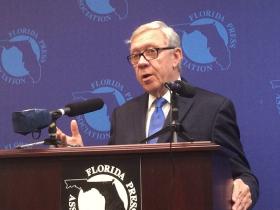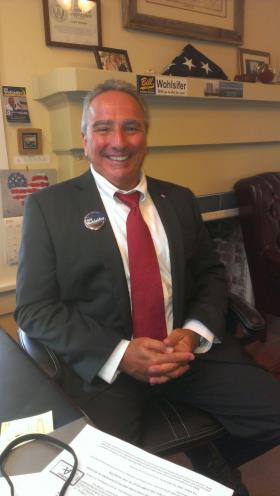It’s Time to Demilitarize the Police
On May 27 of this year, a Tampa Police Department SWAT team shot and killed29-year-old Jason Westcott during a raid over alleged sales of less than $200 of marijuana. Officers claim Westcott was armed, and that they shot him in self-defense. Months earlier, Westcott had gone to the authorities because he had been receiving death threats, and was advised by the same police department that would later invade his home to be prepared to use deadly force against home invaders.
On June 10, a Department of Homeland Security SWAT team stormed into a Homestead couple’s residence at 6:15 a.m., deploying flash grenades and tear gas. Officers forcibly removed the towel the woman was using to cover herself and handcuffed her, leaving her to lie naked on the floor while they ransacked the house. The couple still has not been given any information about why they were raided.
On July 30, Madison County Sheriff’s Office deputies raided a Madison family’s home at 5 a.m., terrorizing them with drawn weapons and flash grenades. A 16-year-old boy was dragged out of bed at gunpoint and handcuffed. Deputies did not find the alleged drug dealer they were searching for, because they had raided the wrong house.
On July 31, a Miami Police Department SWAT team raided a house in Coconut Grove where three children were home alone. Two of them were injured—a 13-year-old claims an officer struck him in the head with a rifle (a police spokesman said the child “ran into an officer’s weapon”), and a 12-year-old claims an officer punched him in the eye.
And on and on. The stories are as horrendous as they are plentiful (although exact statistics are hard to come by, which is in itself a problem). Police officers have difficult and often dangerous jobs, and they need to be able to protect themselves, but we cannot allow that to become an excuse to trample on the rights—and all too often, lives—of the most vulnerable.
Yet that is exactly what these shocking displays of force tend to accomplish. They disproportionately target the poor and powerless, often for crimes as minor as simple drug possession, and with little regard for whether the suspect actually poses a threat to officer safety. The frequency with which SWAT teams storm into the wrong house, needlessly kill family pets, and provoke confused and terrified homeowners into defending themselves (with predictably tragic results) strongly suggests that many raids are not conducted with even a basic acceptable level of professionalism. Even when raids are “successful”, they can take an incredible emotional toll on the innocent family members, friends, and neighbors caught in the crosshairs.
Unraveling the myriad flawed policies and perverse incentives that brought us to this point will not be easy, but the status quo is unacceptable. Lives are being destroyed on a daily basis. While many aspects of the problem need to be addressed at the federal level, with the right reforms Florida can increase the safety of both private citizens and police officers, demonstrate a newfound respect for civil rights, restore public trust and confidence in law enforcement, and become a model for other states to follow. I believe the following changes would be major steps in the right direction:
Require police officers to use body cameras and dashboard cameras at all times while on duty, and establishing a presumption in favor of the defendant’s version of events in cases where an encounter should have been recorded but was not (or the recording has been lost or destroyed). Used properly, cameras can be vital tools in both protecting private citizens from abuse and in protecting police officers from false accusations.
Limit the use of SWAT raids to situations where such overwhelming force is truly called for. Too many of these raids and other aggressive police actions target people suspected low-level, non-violent crimes. If paramilitary equipment and tactics are to be used at all, it should be in response to extreme violence, not as a means of introducing violence into a situation that could have been handled peacefully.
Prohibit “no-knock” forced entry raids. It should be self-evident that when police invade a home without clearly announcing who they are, they are increasing the likelihood that the residents will attempt to defend themselves (as was allegedly the case for Jason Westcott).
Strengthen protections against civil asset forfeiture abuses, removing the terrible incentives that allow law enforcement agencies to directly profit from criminal investigations by seizing cash and other assets—sometimes without even convicting the owner of the seized property of a crime.
Require law enforcement agencies to develop protocols and training methods aimed at resolving situations without violence. Police officers are often trained as if they are soldiers preparing for battle, and too many seem to have taken this to heart.
Require law enforcement agencies to keep and report statistics regarding how many raids they conduct, how the raids are conducted, what evidence was sought, what evidence was recovered, and whether there were any injuries (to officers, suspects, or innocent bystanders) or property damage. Police militarization has become such an insidious problem in large part because the public has been kept in the dark about many of the more unsettling details.
End the “war or drugs”. A full accounting of the devastation wrought by drug prohibition is a subject for another day, but any serious approach to police reform has to acknowledge its central role in dismantling privacy and civil liberties, suppressing poor communities, destroying families, and giving the police free reign to harass, intimidate, and abuse.
I call on the other District 8 candidates to join me in supporting these reforms.

 TONIGHT is the 1st night of many on the job for #TeamWohlsifer and I am looking forward to it!
TONIGHT is the 1st night of many on the job for #TeamWohlsifer and I am looking forward to it!
